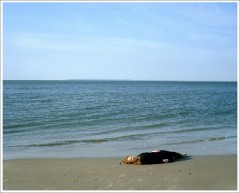Editorials — June 27, 2013 9:57 — 1 Comment
The Monarch Drinks With Dawn Trudeau
I was late. Dawn Trudeau, co-owner of the Seattle WNBA basketball team, The Storm, was punctual. A businesswoman, self-made and supremely successful, of course she was on time. You don’t move from assembly line in Michigan to owner of a professional sports team by being sloppy. She was gracious, not batting an eyelash at my arrival to Queen Anne’s Obasan nearly 10 minutes late of 6:30PM.
The night before, the NBA’s Miami Heat and San Antonio Spurs participated in one of the most epic and entertaining Finals games in history, an overtime contest capped by an unthinkable three-pointer by former Seattle SuperSonic, and current Heat player, Ray Allen. Sipping Sapporos in this quaint little Japanese restaurant, of course we began our conversation with basketball.
“Did you catch the game last night?” I asked.
“I was at The Storm game,” she said (The Storm won the night before, also in overtime). “But I recorded the NBA game and watched the fourth quarter and overtime. Didn’t look like there was very good clock management.”
With jaw-length blond hair, sky-blue top and matching nails, Dawn was calm and collected, listening respectfully as I spoke, flattering me with her composure. It’s a tremendous honor and luxury to own a professional basketball team, yet there are myriad of pitfalls to navigate: the WNBA is only in it’s 16th season, there is a general prejudice against the idea of women playing professional basketball, there is an over-arching disdain for the NBA (and it’s subsidiaries) given that the SuperSonics were lost to a re-location-minded Oklahoma City group.
What shocked me the most, however, was this: “Most sports teams in all leagues,” Dawn said, chop-sticking some noodles, “their biggest generator of revenue is TV. For the women’s game, today, we don’t get paid, we have to pay to broadcast locally.” (ESPN, admittedly, is a national partner and does pay broadcast rights, though a small fraction of what other professional men’s league accrue from TV).
Without viewers, how can the young WNBA grow? At this point, it’s at a big cost to the owners. It took the NBA decades to become a marketing success and decades more to become the monolith it is today. Basketball needs transcendent stars. Enter: Brittney Griner, the 6′ 8″ center for the Phoenix Mercury. I had a chance to see Griner play. She is tall, strong, graceful and someone everyone likes talking about.
“She’s getting notoriety because of her capabilities and so people are curious,” Dawn said. “And people watch, and they say, ‘Whoa! this is actually a good game!'”
Dawn, who grew up in Iowa (a state without any professional sports teams), learned to love sports when she moved to Seattle in the 80’s. “I became a Seahawk fan,” she said, “and then I realized I really liked football.” Following that, she became a SuperSonics fan, learning about the game of basketball, which led her to (be a season ticket holder of) the Seattle Reign, a professional woman’s team that folded in 1998. The Storm came to town as a WNBA expansion franchise in 2000 and The Storm and Supersonics were later purchased by an out of state ownership group in 2006 and it looked like both teams would be relocated. Her ownership group, Force 10 Hoops (comprised of her, Lisa Brummel and Ginny Gilder), jumped for it. She now co-owners one of the three franchises in the WNBA run by women.
“I got into it to keep The Storm in Seattle, purely,” she said. “And all of us were very interested in promoting women’s opportunities.”
Dawn entered the workforce just as the computer age was budding. She stayed ahead of the tech curve and moved through the ranks up to Microsoft, where she earned the Corporate Citizen Award in 1988. “I was in the right place at the right time,” she said.
When I asked her about worry of financial losses in The Storm, her current business venture, she explained, “We knew we were not going to be profitable initially and so we planned funding for the team for, basically, a five-year period. But in 2008, when the economy was suffering and The Sonics moved and there was this sense of anger toward the league in general and sponsors weren’t spending the amount of money as they had before, our loss became significantly greater than we had planned.”
Here is where her business savvy showed: “We decided then,” she said, “that we wanted to invest even more.”
WHOA!
“If we pulled back,” she said, “we wouldn’t get there. So we put more money into the broadcast, we put more money into hiring staff, and more money into marketing so that we could keep the team visible.”
One of the most brilliant business-folk to enter into the professional basketball world is David Stern. Stern, a graduate of Rutgers University (yay!), is the NBA’s Commissioner. He came into power during the Bird and Magic rivalry and continued through the Jordan era into the Kobe and Shaq era, now working in LeBron’s time. I’VE ALWAYS WANTED TO MEET DAVID STERN!
“David is a large personality,” she said.
Dawn has also had the opportunity to meet Bill Gates and since I haven’t had the opportunity to meet either, I asked her briefly about them. “Would you say they share any similar traits?”
“Neither one of them suffers fools gladly,” she said. With Stern’s help, the league’s contract with ESPN has been extended until 2022, giving the WNBA some certainty moving forward. “He’s been a big supporter of ours.”
But the primary goal is still to increase attendance. If games are full, it means there will be eyes on the TV (it’s the same reason the NFL blacks-out local telecasts in cities that don’t sell out their weekly home game). And Seattle, she said, is a good place for that growth.
Growing up, it became clear early, for Dawn, that girls were treated different than boys. In gym class she was assigned the role of cheerleader while her male classmates got to play sports. “That wasn’t fair,” she said. “I wanted to play.” She now works hands-on with Social Venture Partners and Economic Opportunity Institute to help insure more opportunities for women and people of color. It is here, as she eats her plate of yakisoba and I finish mine, that I am reminded of her in full: A woman who forewent her college degree, moving from a factory in Michigan to the male-dominated world of Microsoft, who now leads a diverse group of professional women in the sports world.
But enough of all that! What does Dawn Trudeau do for fun?
“I love music,” she said. “Jazz Alley is one of my favorite venues. I’m also kind of a political junkie.”
I jumped in here, a bit overzealous: “Are you going to run for office?”
She smiled and laughed. “I don’t know. I wouldn’t rule it out.”
Our conversation near over, our waitress retrieving the check and a to-go box, I felt the need to ask Dawn what her secret was? How it was she managed to succeed so brilliantly in the ranks of American business?
“It’s a little bit of jujitsu,” she said. “Using what you have that’s unique and turning the energy a little bit. It has a lot to do with knowing what you can contribute and making sure you’re in a position to make that contribution and then get value for that.” She puts her leftovers in the to-go box. She resumes, “I need to feel productive. That’s what makes me happy. I need to feel like there’s a reason that I’m here, that I’m not just taking up space, I’m putting something back in. And you have to work for that.”
Patient and confident, Dawn Trudeau inspires.
I pay the tab and we part, until the next game.
One Comment
Leave a Reply
The answer isn't poetry, but rather language
- Richard Kenney





I first thought our dear Uitti went off the rails with this one. Although we’ve grown accustomed to his suck-up interviews (has he ever posed a provocative or adversarial question?), where he invites us to join him in some trendy venue while he sniffs about the nether parts of the successful or likely to be so, to include an entrepreneurial sportive as a subject for a site that bill itself as “a forum for…artists and thinkers” and a “literary and arts magazine” stretches any bounds of tolerance. Maybe he should hang out around the gated communities of Bellevue and score an interview with a successful plastic surgeon. Such was my initial reaction.
But wait a minute, those precisely ARE Uitti’s editorial rails. Just as TMR doesn’t ‘review’ anything, offers no criticism, either through cowardice, a fear of giving offense, or just plain laziness, the ‘drinks with’ series is the sort of pap that any publicist would traffic in. Our dear Uitti, a boulevardier in search of milieu, a salonist sans salon, pimps out his considerable writing skills and talent and bedrock intelligence (wait a minute, let’s allow skilled and and talented, but the guy smokes, how intelligent can he be?) to what cries out for a coinage: Ur-banality. (Pardon the hyphen, but one can’t presume perspicacity.)
But as I said, I was wrong in my initial assessment, and am wrong generally on an astonishingly regular basis, though I’m not wrong in admiring our estimable editor.